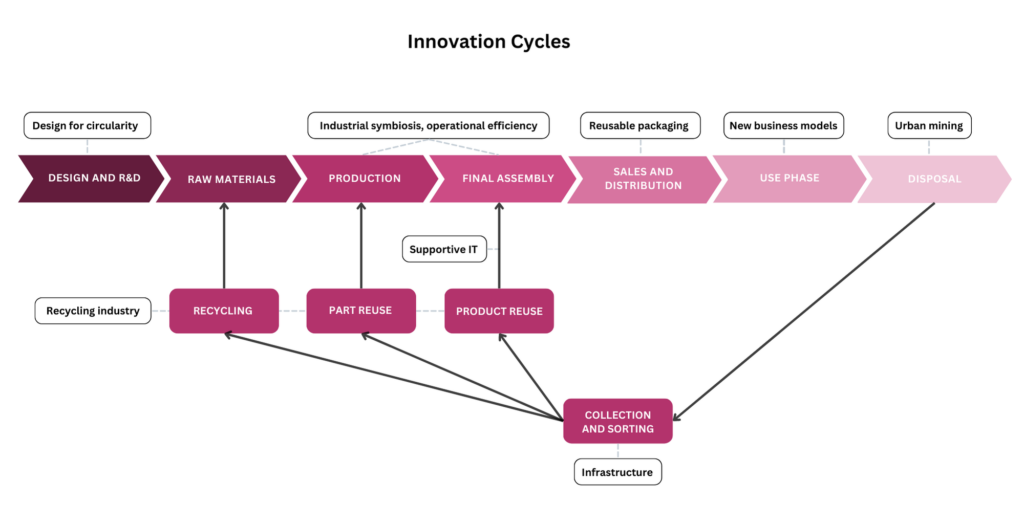Innovation Potential for a Circular Economy “Made in Israel”

Share this Post
Authors: Vered Blass & Nicole Stein
The word “Circular Economy” has become a buzzword – not only in Israel, but worldwide. Throughout the global economic and political discourse, the Circular Economy seems to be a “hot topic”. Everyone talks and writes about it, but implementation is still on the starting blocks for many practitioners who are still puzzled on how to actually implement this new concept. Where does the Circular Economy meet different business units and how does it quantify circularity contribution? Although we know that the Circular Economy is a broad concept, many people still think about it as recycling and reuse at higher rates. While this is important to achieve, there is still more room for innovation in order to truly implement a Circular Economy – even more so within a small-scale economy, such as the Israeli economy.
Circularity Along the Value Chain
The Economic Cooperation and Trade Division (ECTD) of the United Nations Economic Commission for Europe (UNECE) focuses on five entry points for promoting circularity: waste management, procurement, traceability of value chains, standards and regulations, and efficiency of trade and logistics chains. However, these points are hardly sufficient as a guideline for implementers. The circular Economy is a systemic concept requiring more than singular activities. Innovation for circularity is needed along the entire life cycle of products and services. From design to production, from packaging to new business models, and consumer acceptance, all the way to new small-scale recycling technologies, urban mining, and ICT support. Figure 1 demonstrates the space for innovation in each of the extended value chain sections. The arrows show the space for circularity within stages and across phases.

As it is seen in figure 1, innovation is needed and can be implemented across the entire value chain and ecosystem. Products and services can be designed under the guidelines “Design for Circularity, including, for example: durability, multi functionality, and modularity. Within the production and assembly phases, the potential of industrial symbiosis can be fulfilled, and operational efficiency can be increased. Reusable packaging solutions, mainly secondary packaging, such as boxes, are being innovated today to include circularity options for reusing packages around the world. We see growing evidence for innovation in business models, in the form of service instead of ownership and remanufactured products. Finally, at the end of a product’s or material’s life, instead of disposing items into landfills, we have a growing market for secondary use for materials, and product levels. This requires collecting and sorting infrastructure, supportive IT to track data, and innovation in small scale recycling processes which do not currently exist. Since these options are not available, concepts, such as urban mining can be implemented.
The Situation in Israel
In Israel, designers and engineers are not well-trained yet to think about circulatory systems in its early development stages. For the production part, in the last two years, the Israeli government has been running a new industrial symbiosis program that prevents many waste exchange transactions. In packaging companies, such as Plasgad, innovative solutions for reusable boxes are being created from plastics with reusable secondary packaging options for food, beverages, and agriculture sectors. New business models of equipment services, such as the TULU startup is providing building owners to offer great alternative consumption models for their residents. Supportive IT can come in the form of information sharing between producers, consumers, and recyclers or user-friendly applications to promote more sustainable circular lifestyles. The digital sharing economy platforms are also required to avoid waste and encourage other routes for wasted resources, in forms of food, housing, mobility, clothing, and all other types of items. Since Israel is leading in the software industry, there is a window of opportunity for Israel to lead on such IT and applications development.
Israel must also invest in small-scale recycling processes so imported materials can remain in the local economy once reaching the end-of-life stage. For a country so poor in natural resources, without waste exchanges with neighboring countries, small scale recycling, facilities of metals, rare earth materials, plastics, wood, and minerals are critical for keeping materials in the local economy. Urban mining within old landfills and with pre-collected streams of waste, such as electronic waste, can help stabilize the demand for associated materials. The waste management sector, which is underdeveloped, can highly benefit from the supportive smart collection infrastructure, including smart bins and platforms, which have not been invented yet.
The cross-industry collaboration spanning from academia to entrepreneurs and the corporate world is crucial to promote new ideas and employ cutting-edge technology, and science-based innovation. Especially fields like water treatment, science materials, and related recycling processes as well as smart infrastructure, which would immensely profit from joint efforts. The recent Abraham accords in the middle east can also facilitate a regional collaboration to achieve large scale operations, which is needed for some of the processes to be economically sound. Technologies in support of the circular economy are needed worldwide. Israel can become a world leader in the (Digital) Circular Economy, if we succeed in building the relevant eco-system for innovators, investors, and industry partners in our local community.
The opinions expressed in this text are solely that of the author/s and do not necessarily reflect the views of IPPI and/or its partners.
Share this Post

What are Filter Bubbles and Digital Echo Chambers?
Many experts are concerned that the curation of content on social media platforms limit our chances of encountering…

Making Smart Mobility Sustainable
How to Leverage the Potential of Smart and Shared Mobility to Mitigate Climate Change Smart and shared mobility…

Carbon Pricing and Just Transition
Carbon Pricing and Global GHG Emissions Economically, carbon pricing is regarded as the most efficient climate change mitigation policy,…
